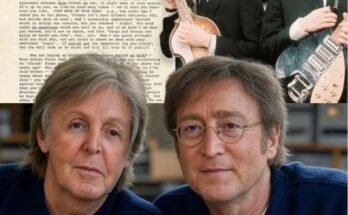In March 1966, a single offhand comment from John Lennon ignited one of the biggest controversies in rock history.
It wasn’t a song.
It wasn’t a scandal.
It was just one sentence — and it nearly destroyed The Beatles in America.
“We’re more popular than Jesus now,”
Lennon said during an interview with British journalist Maureen Cleave.
At the time, it barely caused a ripple in the UK. But months later, when the quote resurfaced in the U.S., it blew up like wildfire — especially in the Bible Belt.
America Reacts: Outrage, Fire, and Fury
By summer 1966, American youth were obsessed with The Beatles.
But when southern radio stations caught wind of Lennon’s remark, the tone shifted from adoration to outrage.
Evangelical groups, churches, and conservative communities across the South condemned the band.
Radio stations organized public record burnings — encouraging fans to bring Beatles albums, photos, and merchandise and toss them into bonfires.
Some DJs stopped playing their music altogether.
The Ku Klux Klan even made threats.
And in several states, Beatles concerts were protested — sometimes violently.
The Beatles went from adored to demonized — practically overnight.
John’s Apology: Awkward, Honest, and Necessary
The band was about to begin their 1966 U.S. tour when the backlash hit full force.
Under intense pressure and fearing for their safety, John Lennon was forced to address the comment in a press conference in Chicago.
He clarified:
“I’m not saying we’re better or greater… I said ‘what’ — and it’s true… I’m sorry if it offended.”
It wasn’t a full retraction, but it was enough to calm some of the flames — literally and figuratively.
Still, the damage had been done.
Why Did He Say It?
Lennon’s original quote was a commentary on fading religion in modern society, not arrogance.
He was speaking about how young people were turning to pop culture — bands like The Beatles — for meaning and identity, often more than religion.
It was philosophical. Not blasphemous.
But in 1960s America, especially in deeply religious regions, nuance got lost in translation.
The Tour From Hell
The 1966 U.S. tour turned out to be The Beatles’ last.
Along with the backlash from the “Jesus” remark, the tour was marked by chaos, protests, threats, and exhaustion.
By the end of it, the band had had enough.
They quit touring altogether and turned inward — focusing on studio innovation instead of live shows.
In many ways, this controversy pushed them to evolve into the experimental artists they became.
Final Thought
John Lennon didn’t mean to spark a cultural war.
But in 1966, one sentence did just that.
It shook fans, rattled the media, and nearly brought The Beatles’ American dream crashing down.
Yet, from that firestorm came a turning point — one that would forever change not just The Beatles, but music itself.



